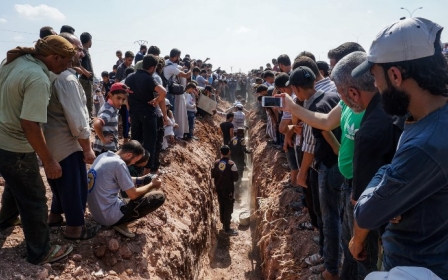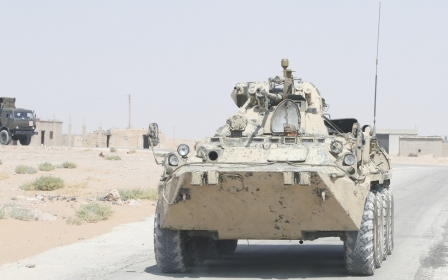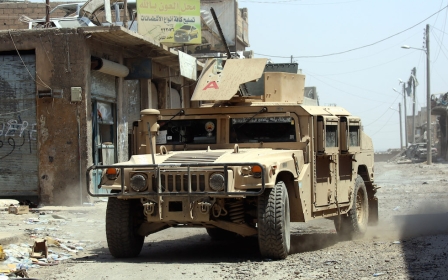Syrian army enters IS stronghold as Russian strikes kill 14 civilians

Russian-backed Syrian government forces on Friday broke into the eastern town of Mayadeen, one of the Islamic State group's last bastions in the country, a monitor said.
"With support from Russian aviation, regime forces entered Mayadeen and took control of several buildings in the west of the town" in the eastern province of Deir Ezzor, Rami Abdel Rahman, head of the Britain-based Syrian Observatory for Human Rights, told AFP.
The Observatory said on Thursday that the Syrian army and its allies were only six kilometres from Mayadeen.
The monitor added that Russian air strikes killed 14 civilians as they were crossing the Euphrates river near the city.
"They were crossing the river on makeshift rafts in a village south of Mayadeen," Observatory director Rami Abdel Rahman said, adding that three children were among those killed overnight.
Islamic State has staged fierce counter-attacks in central Syria in recent days, testing the army's control of an area seized in a months-long eastward offensive.
Backed by Russian air power, the army has continued its advance towards Mayadeen from Deir Ezzor along the Euphrates valley.
In June, two US intelligence officials told Reuters that they believed Islamic State had moved most of its diminished command structure and propaganda team to Mayadeen, southeast of its former capital of Raqqa.
The observatory said on Friday there were clashes in several areas in eastern Deir Ezzor province. The Syrian military shelled Mayadeen overnight and Syrian and Russian warplanes have conducted hundreds of strikes, it said.
Hezbollah, part of the military alliance supporting President Bashar al-Assad, said this week a senior commander had been killed in an Islamic State attack in Syria's central desert.
Helped by the Russian military and Iran-backed militias last month, the Syrian army's advance to Deir Ezzor lifted a three-year-long siege imposed by Islamic State on a government-held enclave in the city.
Islamic State has lost swathes of territory to the Syrian government and to US-backed Syrian militias that are waging separate campaigns against the militant group's last major strongholds in Deir Ezzor province.
On Wednesday, the observatory reported military jets believed to be Russian killed at least 60 civilians near Deir Ezzor.
They said the jets targeted rubber dinghies and boats carrying dozens of families fleeing al-Ashara.
“Russian jets staged a second wave of strikes on the boats that were fleeing across the river causing more casualties among those who rushed to rescue earlier survivors,” said Abdullah al-Akaidat, a tribal figure in northern Syria from al-Ashara.
The observatory said last month was the worst for civilian casualties in Syria this year.
At least 3,000 people including 955 civilians were killed in the Syrian civil war last month, as Syrian government and Russian warplanes bombed the last remaining rebel-held strongholds in Hama and Idlib. US-led coalition strikes killed 282 civilians, said the observatory.
Raqqa 'could take weeks'
The battle to flush the Islamic State group of its last holdouts in the Syrian city of Raqqa could drag on for "weeks", French Defence Minister Florence Parly said Friday.
"It's probably a question of weeks," she told France Inter radio, adding: "It's a slow, difficult battle but which is nonetheless effective."
The US-backed Syrian Democratic Forces, an alliance of Kurdish and Arab fighters, stormed IS's Syrian bastion in June and has since wrested 90 percent of the city from the militants.
Parly said the continuing fight for the city centre was "obviously the hardest".
France is part of the US-led coalition that has been pounding IS positions in Iraq and Syria from the air in order to help local forces flush out the militants.
Parly estimated that around 500 French militants remained in Iraq or Syria.
"Many are thrown onto the frontlines. Those who want to flee are forced by Daesh to fight," she said, using an Arabic acronym for IS.
Middle East Eye propose une couverture et une analyse indépendantes et incomparables du Moyen-Orient, de l’Afrique du Nord et d’autres régions du monde. Pour en savoir plus sur la reprise de ce contenu et les frais qui s’appliquent, veuillez remplir ce formulaire [en anglais]. Pour en savoir plus sur MEE, cliquez ici [en anglais].




